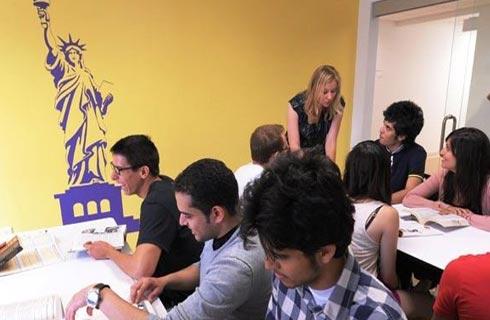政治学哲学博士
Doctor of Philosophy in Political Science

学历文凭
Ph.D.

专业院系
Political Science

开学时间

课程时长

课程学费

国际学生入学条件
The Department of Political Science Doctoral Program admits only students who intend to complete the Ph.D., although students are eligible to receive the M.A. Applicants for admission to the Ph.D. program in political science must meet the following requirements:
A. Submission of Graduate Record Examination (GRE) Test scores (verbal, quantitative, and analytic).
B. Prior training that includes basic work in at least two of the following:
1. Political science
2. Psychology
3. Mathematics or statistics
4. Economics or sociology
C. A bachelor’s degree with at least a B average in the major subject.
D. Three letters of recommendation from instructors or academic advisors.
E. In those cases where the departmental admissions committee deems it desirable, personal interviews with departmental representatives may be necessary.
Acceptance by both the Department of Political Science and the Graduate School is required.
English Proficiency
IELTS: Overall score of 6.5, with no subsection recommended to be below 6; and TOEFL iBT: Overall score of 90 for doctoral applicants and 80 for master’s applicants.
IDP—雅思考试联合主办方

雅思考试总分
6.5
- 雅思总分:6.5
- 托福网考总分:90
- 托福笔试总分:160
- 其他语言考试:Duolingo - 110
CRICOS代码:
申请截止日期: 请与IDP联系 以获取详细信息。
课程简介
The doctoral concentration in political psychology/behavior applies contemporary psychological theories, concepts, and research methods to the study of political behavior. Students are trained in topics and methods associated with psychology as well as political science. Methodological concerns focus on experimentation and survey research. In addition to formal training in methods appropriate to the psychological study of political behavior, students are apprenticed to ongoing research projects throughout their course of training. Students become familiar with the department's extensive and well-equipped laboratories and the regular subject pool. Opportunities are also available to take part in ongoing survey research projects. The concentration in political economy and public policy emphasizes the interaction between politics and the institutions (both public and private) that shape economic policies. Students choosing this concentration analyze important issues by focusing on decision-making and organizational behavior as shaped by individual incentives and institutional structures. In addition to the foundation course in public policy required of all students, elective seminars in this field include policy evaluation, organizational decision-making, bureaucracy, regulation, institutional analysis, and urban politics. The American politics concentration provides a broad perspective on national political institutions and processes, with particular emphases on elections and courts. Courses focusing on political parties and elections, the legislative process, the American judiciary, electoral behavior, American political ideology, and public choice theory are offered. Students become familiar with the kinds of quantitative and formal analysis techniques most often applied to the study of American politics. Seminar papers allow students to go into detail on topics of special interest.
相关申请
 预科
预科 奖学金
奖学金 实习机会
实习机会 在校学习
在校学习 跨境学习
跨境学习 校园授课-线上开始
校园授课-线上开始 在线/远程学习
在线/远程学习
开学时间&学费
学费信息仅供参考,请与IDP联系以获取详细信息
| 开学时间 | 时长 | 学费 | 地点 |
|---|
学校排名

世界排名251
数据源:
泰晤士高等教育世界大学排名
关于纽约州立大学石溪分校

石溪大学(简称 SBU)成立于 1957 年,位于纽约州长岛,是一所充满活力的公立大学。该大学共有约 25000 名学生,其中包括 17000 多名本科生,支持着一个庞大而多元化的学术社区,同时提供丰富而令人兴奋的大学体验。该大学提供广泛的本科、研究生和博士课程,涵盖多个领域。该校在科学、工程和医学方面拥有坚实的基础,并辅以艺术、人文和社会科学课程。热门专业包括生物医学工程、海岸环境研究和计算机科学,每个专业都将学校的前沿研究与基于实践经验的学习相结合,为学生完成学业后从事专业工作做好准备。根据2024年《美国新闻与世界报道 》,SBU 在纽约州公立大学中排名第一,在全美公立大学中排名第 26 位。同一份研究报告还将该大学的社会流动性排在全美第 12 位,并跻身全美十大最多元化大学之列。SBU 是纽约州立大学(SUNY)系统的一部分,并于 2022 年被纽约州州长正式指定为纽约州立大学的两所旗舰大学之一。该大学的长岛校区为学生提供了一系列美丽的海滩,同时还拥有靠近纽约市的所有优势,为学生提供了丰富的教育和课外活动机会。
本校相关课程

妇女与性别研究文学士
学历文凭
Bachelor Degree
开学日期
课程费用总额


技术系统管理理学学士
学历文凭
Bachelor Degree
开学日期
课程费用总额


可持续发展研究文学学士学位
学历文凭
Bachelor Degree
开学日期
课程费用总额


西班牙语言文学学士学位
学历文凭
Bachelor Degree
开学日期
课程费用总额


社会学文学学士
学历文凭
Bachelor Degree
开学日期
课程费用总额


社会工作科学学士学位
学历文凭
Bachelor Degree
开学日期
课程费用总额

其他相关课程

政治学文学士/中等教育社会科学教育硕士
 德保罗大学-EC高等教育
德保罗大学-EC高等教育学历文凭
Combined Baccalaureate and Master's Prog
开学日期
课程费用总额










